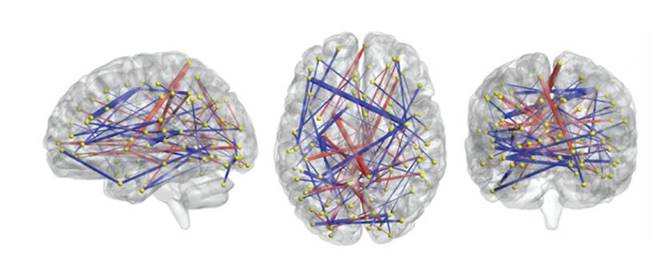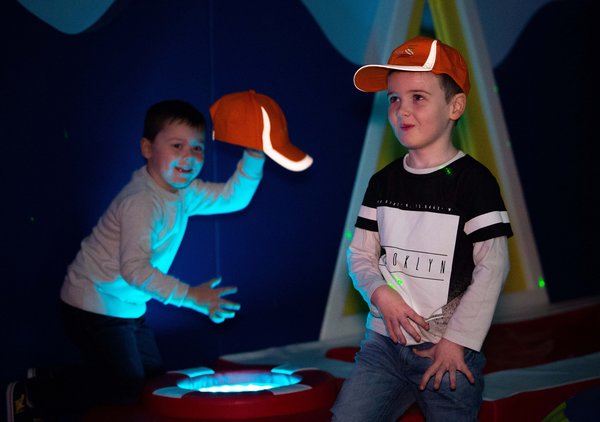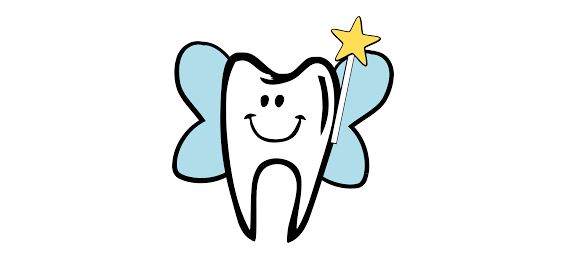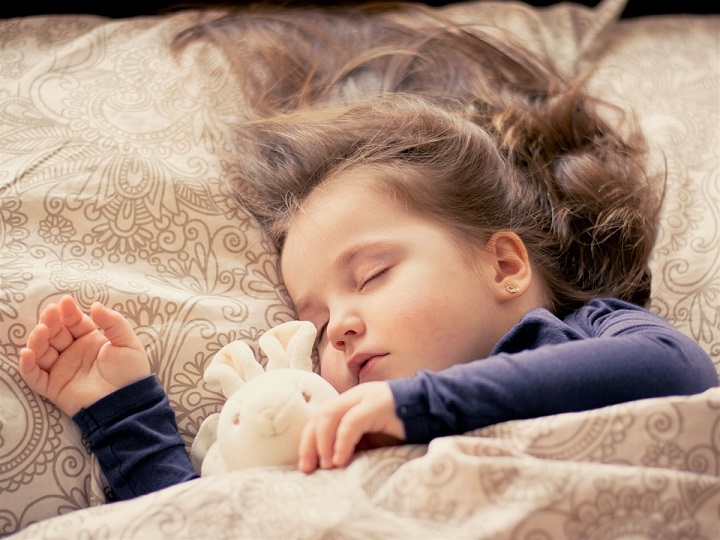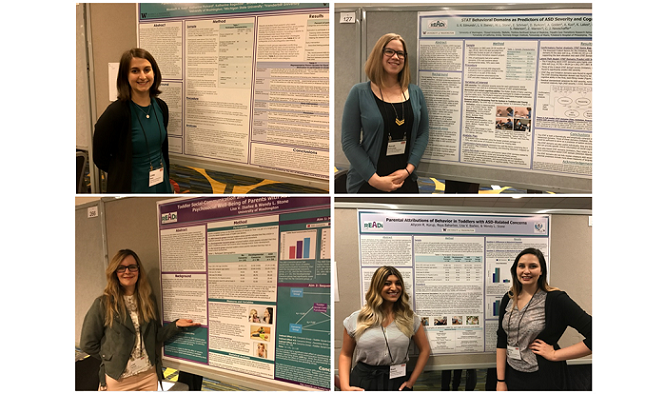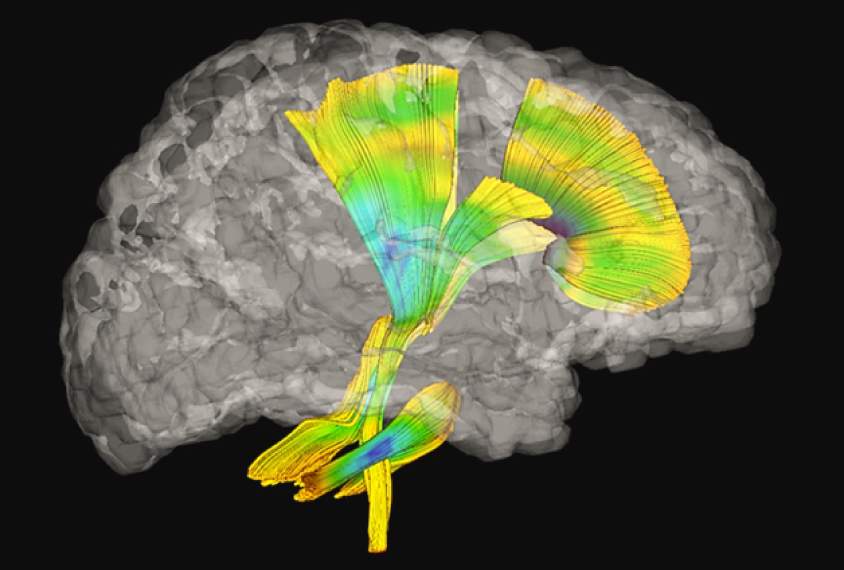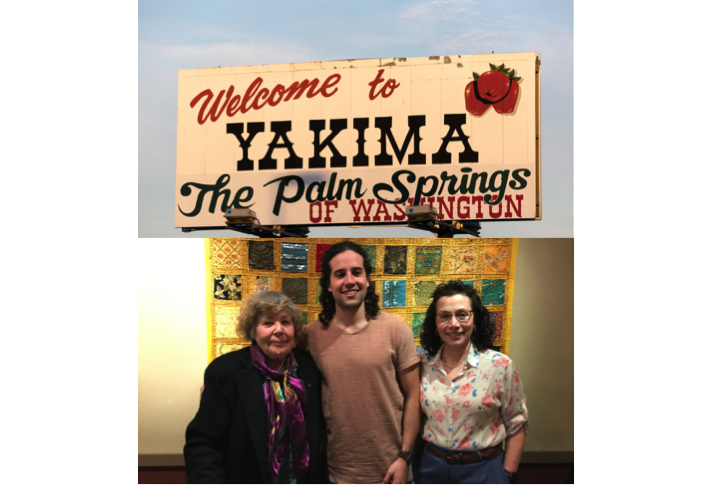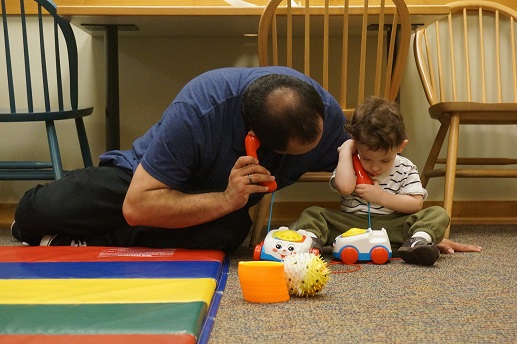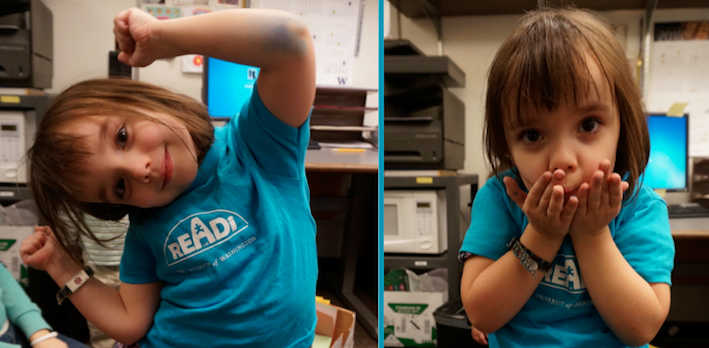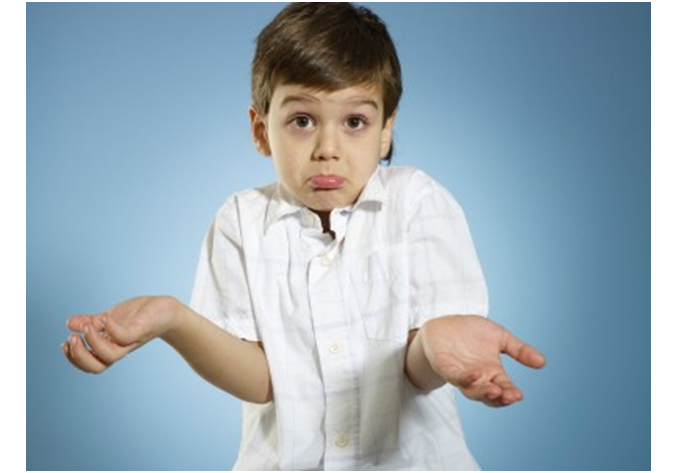The READi Lab bids farewell (really more like “see you later”) to Colleen Harker, who began her road trip to LA last night, where she will be completing a clinical internship at UCLA. We will miss you, Colleen!
Why do Latino children receive later ASD diagnoses?
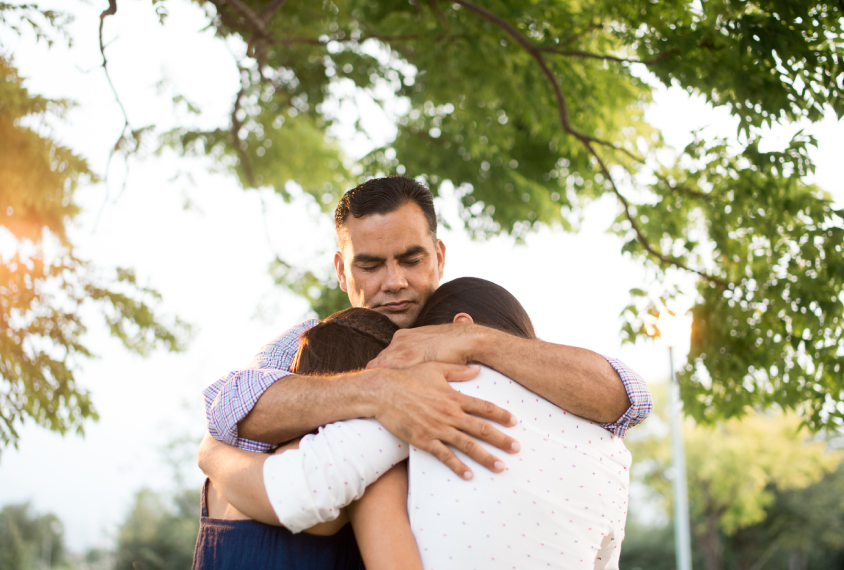 Latino children in the U.S. receive an ASD diagnosis at older ages than non-Latino white children. A new study by Dr. Katharine Zuckerman sheds some light on the reasons why. Zuckerman surveyed 352 parents of children with ASD, both Latino and non-Latino, to identify the barriers they encounter when accessing diagnostic and treatment services. Overall, the 3 most common barriers were the stress associated with the diagnostic process, parental lack of knowledge about ASD, and challenges navigating the medical system.
Latino children in the U.S. receive an ASD diagnosis at older ages than non-Latino white children. A new study by Dr. Katharine Zuckerman sheds some light on the reasons why. Zuckerman surveyed 352 parents of children with ASD, both Latino and non-Latino, to identify the barriers they encounter when accessing diagnostic and treatment services. Overall, the 3 most common barriers were the stress associated with the diagnostic process, parental lack of knowledge about ASD, and challenges navigating the medical system.
Relative to non-Latino white families, Latino families who had limited English proficiency were more likely to: (1) report lack knowledge about ASD and trust in providers as barriers to an ASD evaluation; (2) receive fewer hours of ASD therapy; and (3) have a greater unmet need for therapy.
Interestingly, Latino families who were proficient in English were comparable to the non-Latino white families on these outcomes. These findings underscore the need for improved parent education about ASD and culturally sensitive practices, particularly in underserved communities.
Brain scans may help predict autism in high-risk infants (but not quite yet)
An interesting new study examined functional connectivity between different areas of the brain in 6-month-olds who have an older sibling with autism. A team led by researchers at the University of North Carolina and Washington University School of Medicine used machine learning to predict patterns of brain connectivity that were associated with a diagnosis of autism at 24 months in high-risk siblings. Will we eventually be able to predict a future diagnosis of autism in high-risk siblings as early as 6-months of age? Maybe…but not quite yet. These results need to be replicated on larger, independent samples before we know whether this method will be useful for clinical purposes. Read the full article here >
Airport accommodations for children with ASD
This article describes several strategies that airlines and airports have developed to help children with ASD feel more comfortable during air travel. Strategies include reducing waits on security lines, creating sensory rooms, and providing practice flights. Glad they are paying attention to this important issue! Check it out here!
What can we learn about autism from baby teeth?
Analyzing baby teeth can provide information about a child’s exposure to, and uptake of, metals and other elements. A new study published in ‘Nature Communications’ compared the baby teeth of pairs of twins who were discordant for autism (i.e., only one twin had an autism diagnosis) to look for differences in the presence of elements including lead, manganese, and zinc. (Families had to contact the Tooth Fairy to have her return the teeth for this project.) Cutting-edge laser technology was used to analyze the dentine layers of the teeth to examine both pre-natal and post-natal exposures to the elements (similar to how the rings of trees can provide information about the time course of environmental events).
Their results revealed that the baby teeth from children with autism had higher levels of lead (a neurotoxin) and lower levels of zinc and manganese (essential elements) than children without autism. This pattern was most distinct for the months before and just after birth. This study used some of the same methodology that will be employed in the nationwide ECHO ASD study in which the READi Lab is participating. The ECHO ASD Study will expand on these findings by testing baby teeth for heavy metals, pesticides, and various chemicals found in plastics and electrical equipment in order to better understand how the pre- and post-natal environment might influence the development of autism. To learn more, click here.
Heartwarming Graduation Story
As UW’s graduation is right around the corner, we want to share a touching account of a truly unforgettable graduation ceremony.
Aly Bonville is a recent high school graduate from Alabama whose twin brother, Anders, was diagnosed with autism at two years old. In this article, she describes how she found ways to connect with Anders, as well as how she helped his classmates understand him. Her love and advocacy for her brother fueled her commitment to ensuring that she and Anders would walk across the stage together at high school graduation. After extensive planning, their short walk led to enthusiastic applause, resulting in an experience that she describes as the best 5 seconds of her life. You can read the full story from Autism Speaks here.
Congratulations to Aly and Anders, and the UW class of 2017!
Dr. Stone to present Grand Rounds tomorrow at Seattle Children’s Hospital
Tomorrow morning, Dr. Wendy Stone, director of the READi lab, will be speaking at Seattle Children’s Hospital as part of their Child and Adolescent Psychiatry Grand Rounds series. In her talk, Dr. Stone will describe the barriers to early detection and intervention of autism, as well as discuss current strategies being used in our SRT grant to overcome some of these hurdles. Tune in tomorrow at 8:00am for the live stream of her talk here. You may also check out previous Grand Rounds presentations as well as learn about upcoming talks here.
Resources for a better night’s sleep for children with autism
As many as 80% of parents report that their child with autism does not get a full night’s sleep. Challenges such as falling asleep and staying asleep are common, and may have a variety of different underlying causes, including sensory issues, anxiety, medical conditions, or medication side effects. For many families, simple behavioral strategies that improve “sleep hygiene” can lead to significant improvements in children’s sleep. Tuck.com has compiled a helpful guide for families that provides a detailed, research-based overview of the specific difficulties people with ASD may encounter as well as sleep-management strategies that can be used. Click here to check out the guide!
READi Lab takes over San Francisco!
Last week, several members of the READi Lab team traveled to San Francisco, CA to present their posters at the annual International Meeting for Autism Research (IMFAR) Conference. To view each of the posters, click on the titles! Clockwise from the top left:
Elizabeth Karp: Parent Experiences Enrolling in an RCT with Their High Risk Toddler
Sarah Edmunds: STAT Behavioral Domains as Predictors of ASD Severity and Cognitive Level
Roya Baharloo & Allycen Kurup: Parental Attributions of Behavior in Toddlers with ASD-Related Concerns
Understanding Autism: A Must-See Video
This short video, written and directed by Alex Amelines, illustrates how children with autism may experience the world differently, and how these differences can enrich the world. The video draws a parallel between challenges in learning how to make friends, and challenges learning how to solve math, highlighting how similar we all are, and emphasizing that patience and good communication can go a long way to bridging gaps in understanding. This 5 minute clip is a must see for all parents and educators. Watch for yourself >
https://youtu.be/7JdCY-cdgkI
Why do repetitive behaviors and unusual sensory features co-occur so often in children with ASD?
A new study led by Jason Wolff at University of Minnesota offers a possible explanation. Wolff’s team examined white matter tracts (which are bundles of neurons that connect different areas of the brain) in 217 younger siblings of children with autism. They found three unusually structured nerve tracts in 6-month-olds who were later diagnosed with ASD and exhibited both repetitive behaviors and unique sensory features. One unusual pathway was found in the corpus callosum, which connects the two halves of the brain, and two unusual pathways were in the cerebellum, which is often associated with processing sensory stimuli. The more active these three pathways were at 6 months, the more severe the child’s sensory features and repetitive behaviors proved to be at 2 years. Excitingly, these structures may prove to be an early biomarker for two correlated features of autism and may help researchers understand more about the neural origins of autism and its symptoms. Click here to learn more about the study.
Home sweet home
This week, READI Lab research assistant Juan Pablo Espinosa returned to Yakima, his second home town (Mexico City is his first), to assist the SRT team with another round of STAT and RIT trainings. In between workshops for providers at Yakima Valley Farm Worker’s Clinic and Children’s Village, he took some time to introduce us to his mama and abuela, pictured above. We all feel fortunate to be working with our amazing community partners, but it is extra special for Juan Pablo to get to connect with providers and families in the community that raised him!
Yakima is RIT-Ready!
Last week, the training phase of the Screen-Refer-Treat study kicked off in Yakima County with a Reciprocal Imitation Training (RIT) Workshop at Children’s Village. The 26 attendees, which included early intervention providers, family resource coordinators, early educators, and ABA therapists, learned about the theory behind RIT and how to use it with families in their caseload. During live demonstrations with volunteer families, providers took advantage of opportunities for hands-on practice using RIT as well as coaching parents on their use of RIT with their children — which led to some touching moments, as illustrated above. Overall, the training was a success and the SRT team will wrap up the training phase in Yakima this week with workshops on ASD-specific screening tools for primary care and early intervention providers!
Tele-learning program for families of newly diagnosed children
Wondering what to do after your child’s autism diagnosis? Autism Speaks is hosting a free tele-learning program this month for families with a newly diagnosed child! Parents should tune into the program on Wednesday, April 26th at 4pm PST for information about accessing free autism resources and tools, and to learn about the Autism Speaks organization. Click here to register by April 25th to secure your spot in this webinar!
Upcoming Autism Workshops and Multicultural Support Groups!
Are you interested in connecting with Seattle-area families of individuals with autism? This month, Open Doors for Multicultural Families is offering autism-related workshops that are designed to meet the needs of diverse families who have loved ones with developmental disabilities and special health care needs. These free workshops are open to the whole family and cover topics including an introduction to understanding autism, social communication in autism, and life transitions for students of all ages with disabilities. Additionally, Open Doors offers support groups for African American, Korean, Latino, and Somali parents/caregivers of people with disabilities. For more information about these exciting resources, click here.
Get the Scoop About Sesame Street’s Julia From Dr. Wendy Stone!
Just in time for the kickoff of Autism Awareness Month, Dr. Wendy Stone was interviewed on KING 5’s New Day about Sesame Street’s Julia, which is the show’s new Muppet with autism. Check out the video below to learn more about how and why Julia’s character was developed and see a sneak preview of one of Julia’s first appearances on an episode of Sesame Street.
What an incredible FEAT!
FEAT of Washington announced a major milestone this morning: over one million dollars has been awarded to families of children with autism through Ben’s Fund! Ben’s Fund is a program that provides grants to families of children with autism who require financial assistance to obtain autism-specific services or technology. Families can be awarded up to $1,000 to help support the cost of therapies, adaptive equipment, childcare, summer camp registration, and related activities. If you or someone you know is interested in applying to Ben’s Fund, email bensfund@featwa.org, and check out their website www.featwa.org/grants.
READi Lab Research Registry
Did you know that the READI Lab has a research registry? We are always looking for volunteers who are interested in advancing our understanding of the early signs of autism and the most effective early interventions. Our research registry makes it easier for families to learn about new or ongoing studies for which they are eligible. Families of children with autism, as well as those without autism, are welcome to join.
Signing up for the registry is quick and easy! We’ll just ask you for some information about yourself and/or the family member(s) you wish to enroll. Even if we don’t have a study you qualify for right now, becoming a registry member will ensure that you’re the first to hear about new studies, READi Lab events, and the latest autism research findings.
Your participation in the “READi Registry” can help us learn about how autism develops, how community service providers can recognize autism red flags, and how to improve outcomes for children as well as their families. If you are interested in joining the READi Registry, please click here or call 206-543-2823 to learn more and enroll.
Ever wonder why more boys have autism?
On April 4th, Dr. Sara Webb will be hosting a talk at the Pacific Science Center at 7:00pm that will explore the mechanisms behind the higher prevalence of autism among boys. Admission to the event is $5/person (or free for Pacific Science Center members), and doors open at 6:40pm. Additional event details can be found here.
F.Y.I. Dr. Webb is an Associate Professor in the department of Psychiatry and Behavioral Sciences at the University of Washington. In addition, she is the principal investigator of several projects sponsored by NIH and has funding from Autism Speaks, Autism Science Foundation, Seattle Children’s Research Institute, and many more.
How does healthcare and education legislation affect individuals with autism?
Tune in to this free webinar with Dr. David Mandell to find out! Dr. Mandell is a professor of psychiatry and pediatrics at the University of Pennsylvania, where he also directs the Center for Mental Health Policy and Services Research. On Wednesday, March 29th at 12pm PST, he will discuss the history of federal and state regulations that influence the lives of people with autism, as well as present findings on how future healthcare and education policies should develop in order to improve quality of care. If you are interested in this unique educational opportunity, click here to register.
- « Previous Page
- 1
- …
- 16
- 17
- 18
- 19
- 20
- …
- 27
- Next Page »
